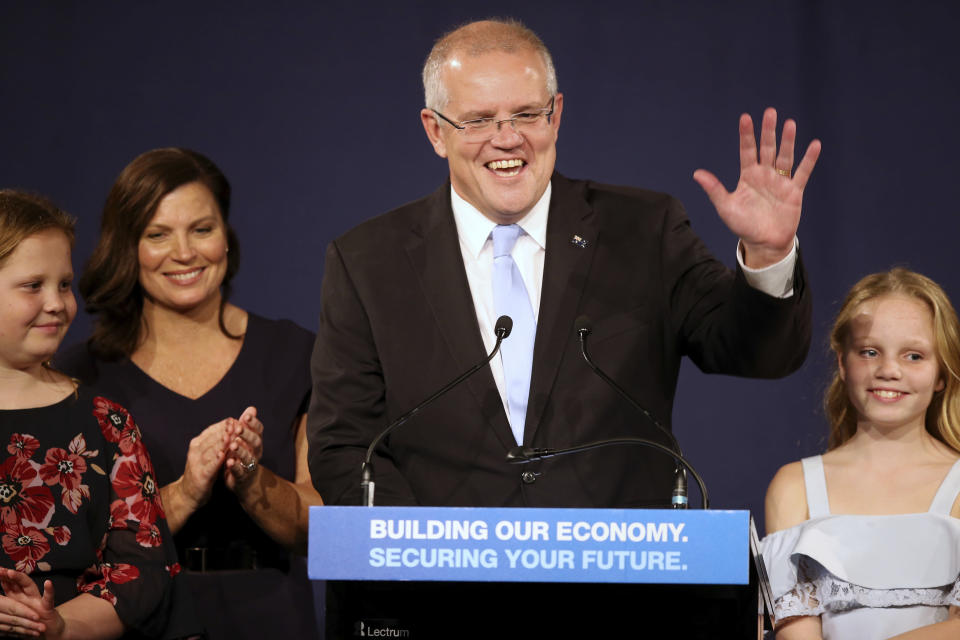Australia government says it won't break tax cut pledge
Australia's newly reelected government says its promise to slash income taxes might be delivered late but will not be broken as it seeks to stimulate consumer spending and revive a flagging economy

FILE - In this May 19, 2019, file photo, Australian Prime Minister Scott Morrison, second right, speaks to party supporters flanked by his wife, Jenny, second left, and daughters Lily, right, and Abbey, after his opponent concedes in the federal election in Sydney, Australia. Australia’s newly reelected administration says its promise to slash income taxes might be delivered late but won’t be broken as the government hopes to stimulate consumer spending and revive a flagging economy. (AP Photo/Rick Rycroft, File)
CANBERRA, Australia (AP) -- Australia's newly reelected government said Tuesday that its promise to slash income taxes might be delivered late but would not be broken as it seeks to stimulate consumer spending, revive a flagging economy and repair relations with China, its most important trading partner.
Prime Minister Scott Morrison chose the latest possible date to call an election that on Saturday delivered his conservative coalition a surprise victory.
But the timing means he probably won't be able to recall Parliament to pass the tax cuts before July 1 — the date he promised during the election campaign that the lower tax rate would take effect.
Treasurer Josh Frydenberg said passing the legislation, which would reduce the annual tax bill of 10 million Australians by 1,080 Australian dollars ($740), is the government's first priority when Parliament resumes.
Frydenberg could not say when the law would be passed, but said media reports that the new tax rates might not come into effect until July 1 next year were wrong.
The tax break was outlined in April in the government's annual budget blueprint for the next fiscal year, which starts on July 1.
"Let me be very clear: The tax relief outlined in the budget will be delivered to millions of Australians," Frydenberg said.
However, the ruling coalition will not hold a majority of seats in the Senate, so the government will need the support of the center-left Labor Party opposition or minor parties to pass the tax law legislation.
Because of the weakening economy and persistent low inflation, Reserve Bank of Australia Governor Philip Lowe suggested on Tuesday that the central bank board was likely to reduce its benchmark interest rate below the current record low 1.5% when it next meets on June 4. The rate has not changed since August 2016.
In more concerning news for an Australian economy that has grown for 28 years without a recession, a university study released on Tuesday found that Chinese investment in the country fell by 50% between 2017 and 2018.
The Australian National University research showed Chinese investment fell from AU$9.6 billion ($6.6 billion) in 2017 to AU$4.8 billion ($3.3 billion) last year — the lowest level in the five years since the university began monitoring Chinese investment. Researchers said the decline was in line with global Chinese investment trends.
Frydenberg said Australia was susceptible to the trade tensions between China and the United States, Australia's biggest source of foreign capital.
"It's very clear that the Australian economy is facing some economic headwinds — economic headwinds globally as trade tensions rise between China and the United States," Frydenberg said. "But the fundamentals of the Australian economy are sound."
In better economic news, the government's reelection contributed to a AU$33 billion ($23 billion) surge in the stock market on Monday to an 11-year high, in part because of expectations of a better business environment and tax cuts.
Analysts see Morrison's re-election as a new opportunity to reset Australia's relationship with China, which suffered under his predecessor, Malcolm Turnbull. Beijing protested when Turnbull announced legislation in 2017 to outlaw covert foreign interference in domestic politics.
Chinese companies were blocked from buying crucial Australian infrastructure and Chinese technology giant Huawei was banned from involvement in the rollout of Australia's 5G telecommunications network on security grounds.
Morrison was thrust into the government leadership last August after colleagues in his conservative Liberal Party lost confidence in Turnbull. Morrison has since been kept busy uniting his government, which was bitterly divided over Turnbull's ouster in a ballot of lawmakers.
Michael Fullilove, executive director of the Lowy Institute for International Policy, a Sydney think tank, said the surprise election result had given Morrison a mandate to reshape the relationship with China.
"His international role essentially begins this week because for the first nine months, he was necessarily distracted by domestic issues. I think he was seen as a stop-gap leader internationally, but now he has a mandate, he has immense authority within in his party," Fullilove told Australian Broadcasting Corp.
"He has inherited a hawkish policy from Prime Minister Turnbull, but that suit doesn't really seem to fit him," Fullilove said. "He's a more commercially minded, more pragmatic person. He and Foreign Minister (Marise) Payne have tried to repair the relationship with China in recent months."
As vote counting continued on Tuesday, the government appeared likely to have as many as 78 seats in the 151-seat House of Representatives, where parties need a majority to govern.
The government will likely have within its ranks the first Chinese-Australian woman elected to Parliament, Gladys Liu.
Morrison led a minority government of 74 lawmakers into the election, with the opposition firm favorites to win.

